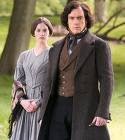Grendel, Wide Sargasso Sea and Jane Eyre all utilize laughter as a method of characterization in order to develop theme and further plot. However, the laughter in each of these novels has a different meaning, and even each instance of laughter in one work creates a different mental sound and picture. In Grendel, laughter directly expresses feelings of superiority that can be tracked throughout the novel’s progression. Rhys’ use of laughter seems more of an indication of comfort or power depending on the situation or character. And laughter in Jane Eyre creates a shrouded, mysterious madness that, even when uncovered, continues to deflect sympathy.
However, despite all of their differences, these examples of laughter in literature all have a common characteristic in that they create much stronger sensation and meaning than common laughter that most people experience every day. It is strange to realize that the unconscious response that most people have to stupidity or wit have such important, and often unpleasant, implications in literature. But it is true that even giggling often implies mockery, such as in Wide Sargasso Sea when the servant girl, Hilda, makes no sound except to cover her mouth and giggle whenever she sees Rochester, implying the condescension so prevalent among the island natives.
Bertha’s laughter in Jane Eyre is set apart from that in the other two novels because of the static nature of the character it describes. Because Bertha is a flat, undeveloped character whose purpose is mainly to delay the marriage between Jane and Rochester, the function of laughter is fairly static within the novel as it characterizes the mysterious demon in the attic. However, both in Grendel and in Wide Sargasso Sea, laughter helps trace the development of characters and the relationships between them. In Grendel, laughter links the dragon and the goldworker creating a strong connection between them and then revealing Grendel’s path through superiority to nihilism.
In a related way, the waxing and waning of laughter in the characters of Wide Sargasso Sea is telltale of their relative strengths. Like Grendel, Rochester builds up a certain confidence, and its climax, where he finally wins control over Antoinette, is indicated by his sudden ability to laugh. Antoinette, on the other, changes from being a part of the island to being consumed by it, and so her laughter changes from carefree laughter, like when she is washing with Christophine, to “a crazy laugh” (89) of pain and jealousy when speaking to her estranged husband. In all three of these novels, the author takes laughter out of its normal daily context in order to expose character traits in a more uncontrolled manner and thus help further plot, character development, and overall theme.
Tuesday, June 2, 2009
Subscribe to:
Post Comments (Atom)










No comments:
Post a Comment